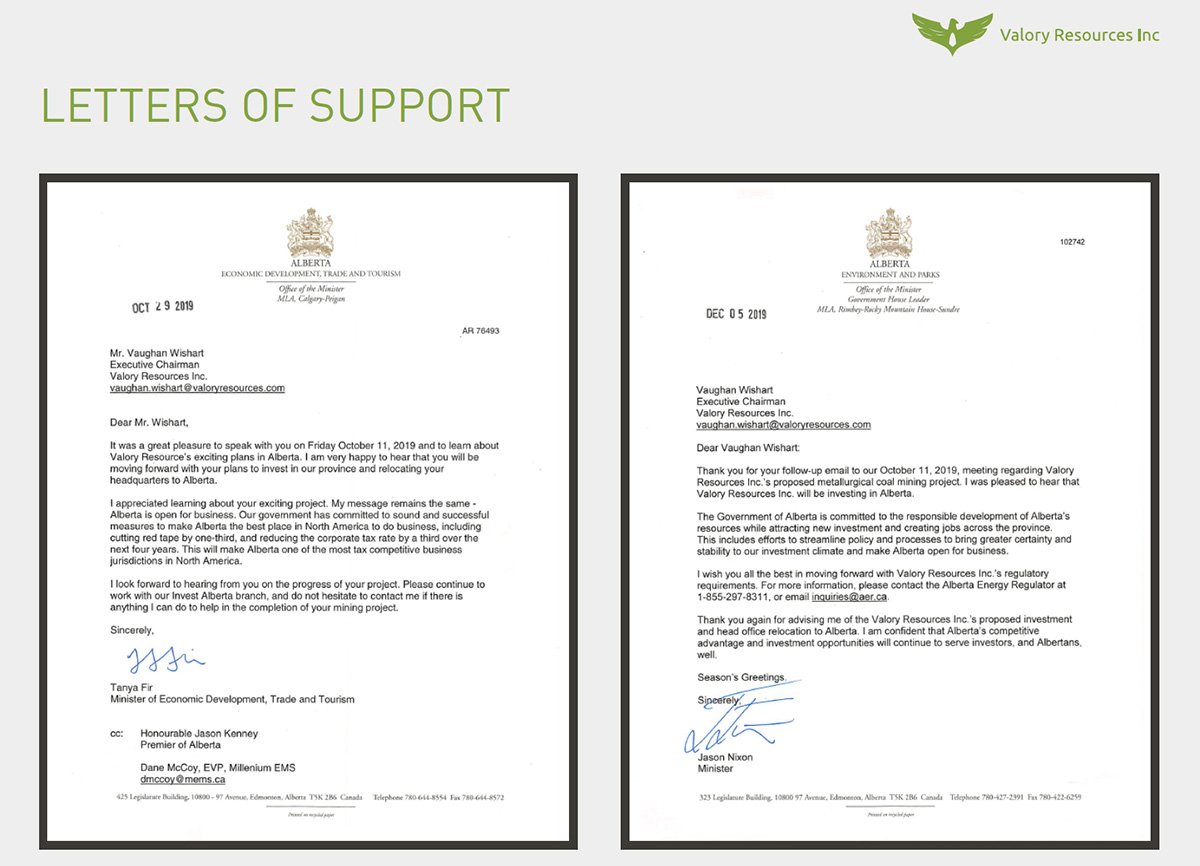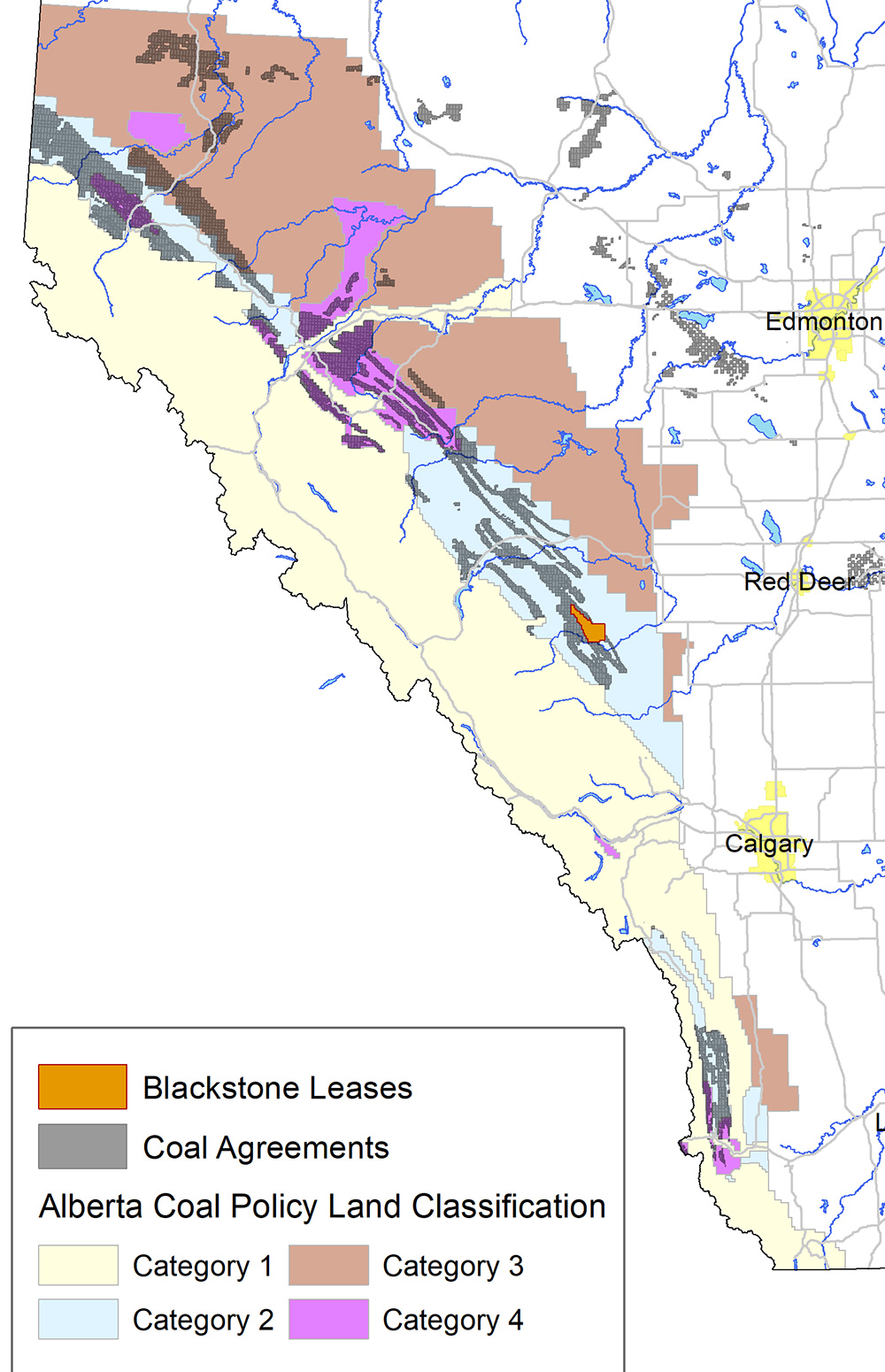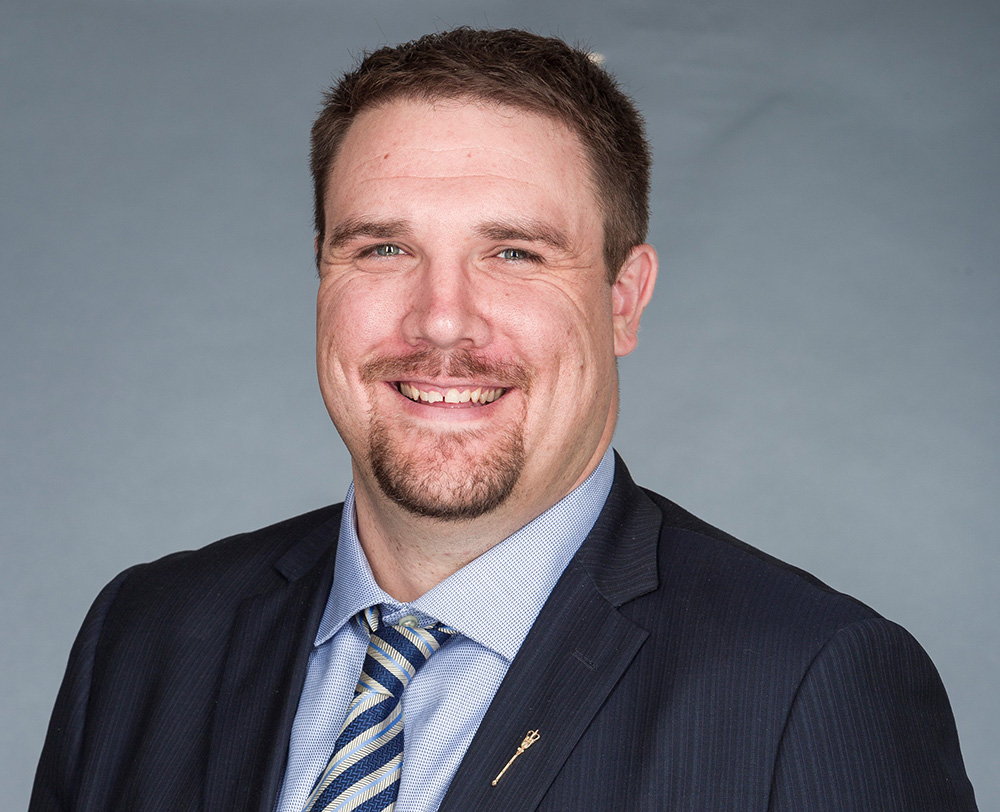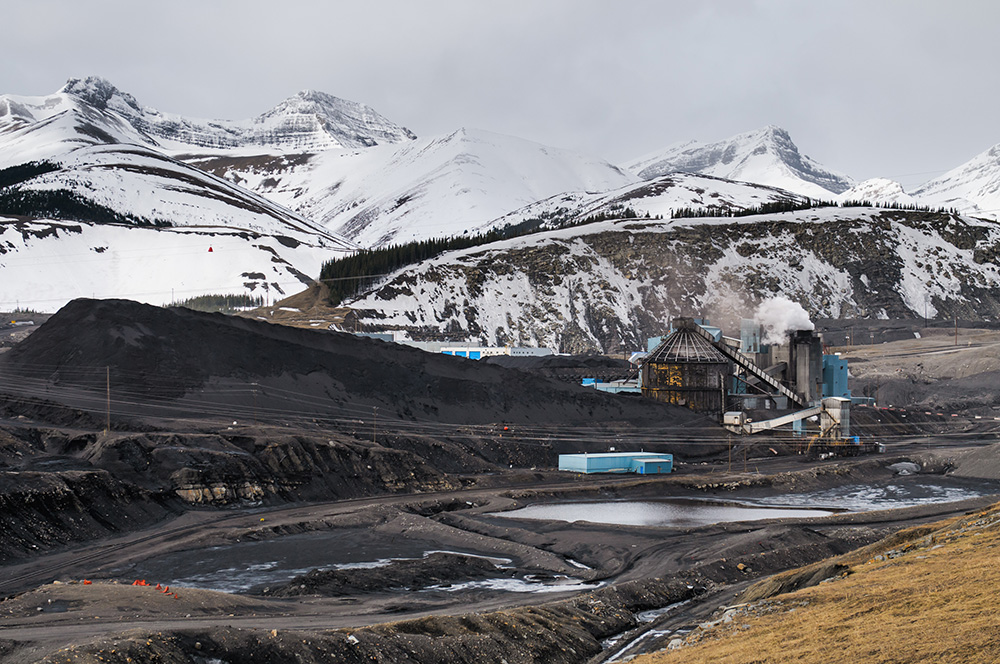Half a year before the Alberta government abruptly rescinded a 44-year-old policy protecting its Rocky Mountain flanks from coal open-pit mining, its ministers were already sending “letters of support” to a new Australian coal mining corporation trying to raise capital on the open market.
Valory Resources Inc. is just one of several Australian firms planning to excavate open-pit coal mines along the Rockies’ eastern slopes, a key source of fresh water previously off limits to surface mining until last June.
That’s when the Kenney government cancelled the protective Coal Policy established in 1976. Under the cover of the pandemic, it did so with no public consultation.
The letters of support — one from Alberta’s minister of tourism and the other from the minister of environment — indicate Valory’s plans were already understood and favoured by the Kenney government well before it changed regulations to make them possible.
Valory, a private company now trying to raise capital for the project, displays the letters in its promotional materials (see page 24 in this pdf).
In a presentation to the town of Rocky Mountain House in central Alberta last month, Valory Resources boasted that it had “recently met with key members of the Legislative Assembly of Alberta and received strong statements of support... which indicates that the Alberta provincial government are ‘pro-development and open for business.’”
The company wants to build a 16,000-hectare open-pit mine near Alberta’s famed Bighorn Wilderness, in a zone that was designated Category 2 by the Coal Policy. The policy allowed underground mining but forbade open-pit mines. Valory is proposing both.
But now that the Coal Policy has been killed, the path is much easier for the Blackstone Project, which would export metallurgical coal through B.C. ports to “meet Asian demand from steel mills.”

After meeting with executives of the Australian company last October, Tanya Fir, minister of Economic Development, Trade and Tourism, wrote Valory’s CEO Vaughan Wishart an enthusiastic letter.
“I am very happy to hear that you will be moving forward with your plans to invest in our province and relocating your headquarters to Alberta,” said Fir.
She added: “My message remains the same — Alberta is open for business. Our government has committed to sound and successful measures to make Alberta the best place in North America to do business, including cutting red tape by one third, and reducing the corporate tax rate by a third over the next four years.”
Open-pit metallurgical coal mines create air pollution, greenhouse gas emissions, wildlife destruction and extensive water pollution. But on Dec. 5, Alberta’s Environment Minister Jason Nixon followed up Fir’s Oct. 29 letter with one equally effusive.
It said the minister was pleased to hear that Valory Resources Inc. will be investing in Alberta and boasted of “efforts to streamline policy and processes to bring greater certainty and stability to our investment climate and make Alberta open for business.”
Nixon’s riding includes Valory’s proposed mine site.
Katie Morrison, conservation director of the southern Alberta chapter of the Canadian Parks and Wilderness Society called the letters highly inappropriate.
“The letter from the environment minister mentions no environment concerns and the letter from the minister for tourism mentions nothing about the impact of open-pit coal mines on tourism in the Rockies. That’s really concerning.”
She added that “It’s highly suspicious the government was making promises to coal companies back in October, seven months before publicly announcing the cancellation of the Coal Policy.”

Nearly half a dozen Australian firms are poised to transform one of Canada’s most iconic landscapes with more than dozen proposed open-pit coal mines along the eastern slopes from the Crowsnest Pass to Rocky Mountain House, Alberta.
One of the financially biggest projects, Grassy Mountain, is being shepherded by Hancock Prospecting, which is owned by Australia’s controversial and richest billionaire, Gina Rinehart.
Her mine, which is the subject of a joint federal and provincial environmental hearing this fall, would reduce 28 kilometres of mountainous terrain north of the town of Blairmore to rubble, and facilitate further development into the eastern slopes.
According to the Canadian Parks and Wilderness Society and the Livingstone Landowners Group, which oppose the developments, coal leases now cover an area about half the size of Vancouver Island, “an area greater than 500 square kilometres (50,000 hectares) of public and private lands from the Castle Park boundary north to Chain Lakes.”
The proposed projects, which have sparked widespread opposition from ranchers, irrigators, environmentalists and ordinary taxpayers, will not only carve the tops and sides off mountains but impact the headwaters of the Oldman River and the North Saskatchewan River.
The proposed mines will also border several critical landscapes including the Beehive Natural Area, the Bob Creek Wildland Provincial Park, the Bighorn Wilderness Area and Castle Provincial Park.

Valory Resources, which owns no operating mines in Australia, isn’t the only Australian company keying off the Kenney government’s relaxed stance on coal mining.
Last April, Atrum, an Australian company that has proposed five open-pit mines over 240 kilometres of mountains north of the Crowsnest Pass, described its Elan project as “a rare opportunity” because of a “new Alberta government” that was “engaged and supportive.”
Its presentation identified one overwhelming risk: its leases were on land protected by the longstanding Coal Policy, crafted by the Tory government of Peter Lougheed.
That policy prevented open-pit mining in the eastern slopes in order to protect the headwaters of major rivers that bring water and life to the Canadian prairies.
But Atrum noted that regular proactive engagement with Alberta government “has significantly increased confidence of such approval.”
One month later the Kenney government killed the Coal Policy with no public debate, calling the move an act of “modernization.”
David Luff, a former assistant deputy minister of the environment who also worked for the Lougheed government, has described the rescindment as “unconscionable.”
The Coal Association of Canada, headed by a former Tory provincial environment minister, has actively lobbied for the axing of the land protection policy.
Atrum recently noted that the Alberta government is also being co-operative on water, which coal mines require in great quantities.
Atrum’s senior Director Tony Mauro told a meeting of the Crowsnest Pass Council last month that the company didn’t have a defined water source in southern Alberta where most watersheds are already over-allocated.
However, the province’s Environment Ministry was working on solving that, he explained, by “seeking to modify” a 20-year policy in order to free up more water from the Oldman River for “interested parties that may have an industrial purpose.”
Other Australian coal companies have praised Alberta for a friendly regulatory regime comparable to the state of Western Australia where Gina Rinehart’s companies do most of their mining.
In November Rob Tindall, an executive of Montem Resources, told a group of miners in Australia that Alberta’s regulatory regime was highly favourable, thanks to the development of the oilsands.
After joking, “I am a coal miner. My presentation hasn’t got any words in it because I can’t read,” Tindall goes on to present plans by Montem, which is listed on the Australian stock exchange, to reopen Tent Mountain, an old open-pit mine in the Crowsnest Pass.
In July 2016, the Alberta NDP led by Rachel Notley granted Ram River Coal Aries Project, a 20,000 hectare open-pit mine, an exemption to the province’s Coal Policy. Atrum Coal and other companies have cited that precedent while lobbying for the cancellation of the Coal Policy.
Last year’s letters of support from Alberta’s ministers to Valory Resources indicate that well before its surprise announcement wiping away the Coal Policy, Kenney’s UCP government was wooing foreign coal companies with eyes on lands then off limits.
“Seeing these letters of support as well as the lobbying records by companies indicates that plans for the rescindment of the Coal Policy were in the making for a quite a while,” said Katie Morrison of the Canadian Parks and Wilderness Society.
“It’s totally inappropriate that Albertans were not involved in a decision that threatens such an invaluable resource such as clean water,” she added. ![]()
Read more: Energy, Politics, Environment

















Tyee Commenting Guidelines
Comments that violate guidelines risk being deleted, and violations may result in a temporary or permanent user ban. Maintain the spirit of good conversation to stay in the discussion.
*Please note The Tyee is not a forum for spreading misinformation about COVID-19, denying its existence or minimizing its risk to public health.
Do:
Do not: